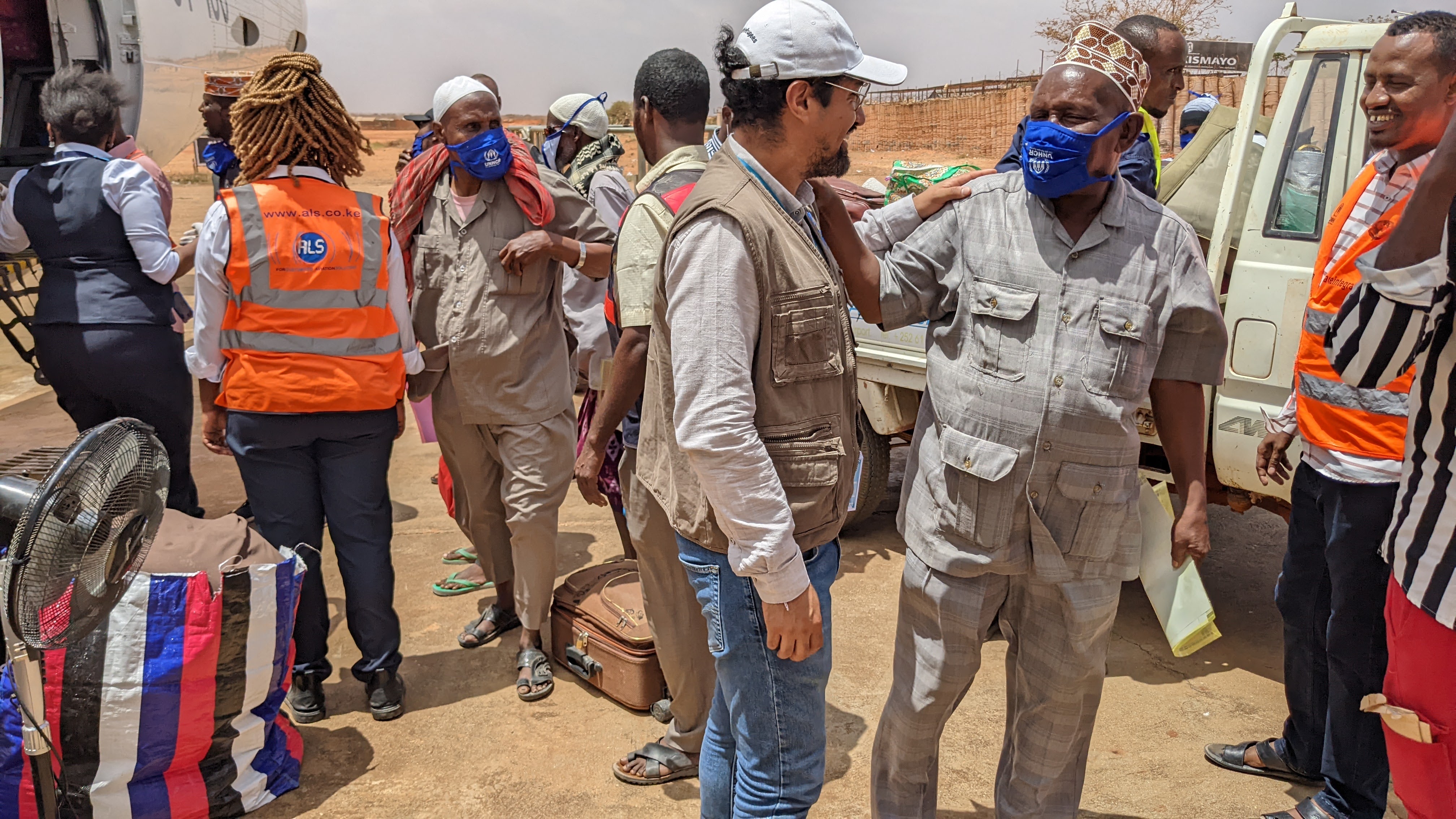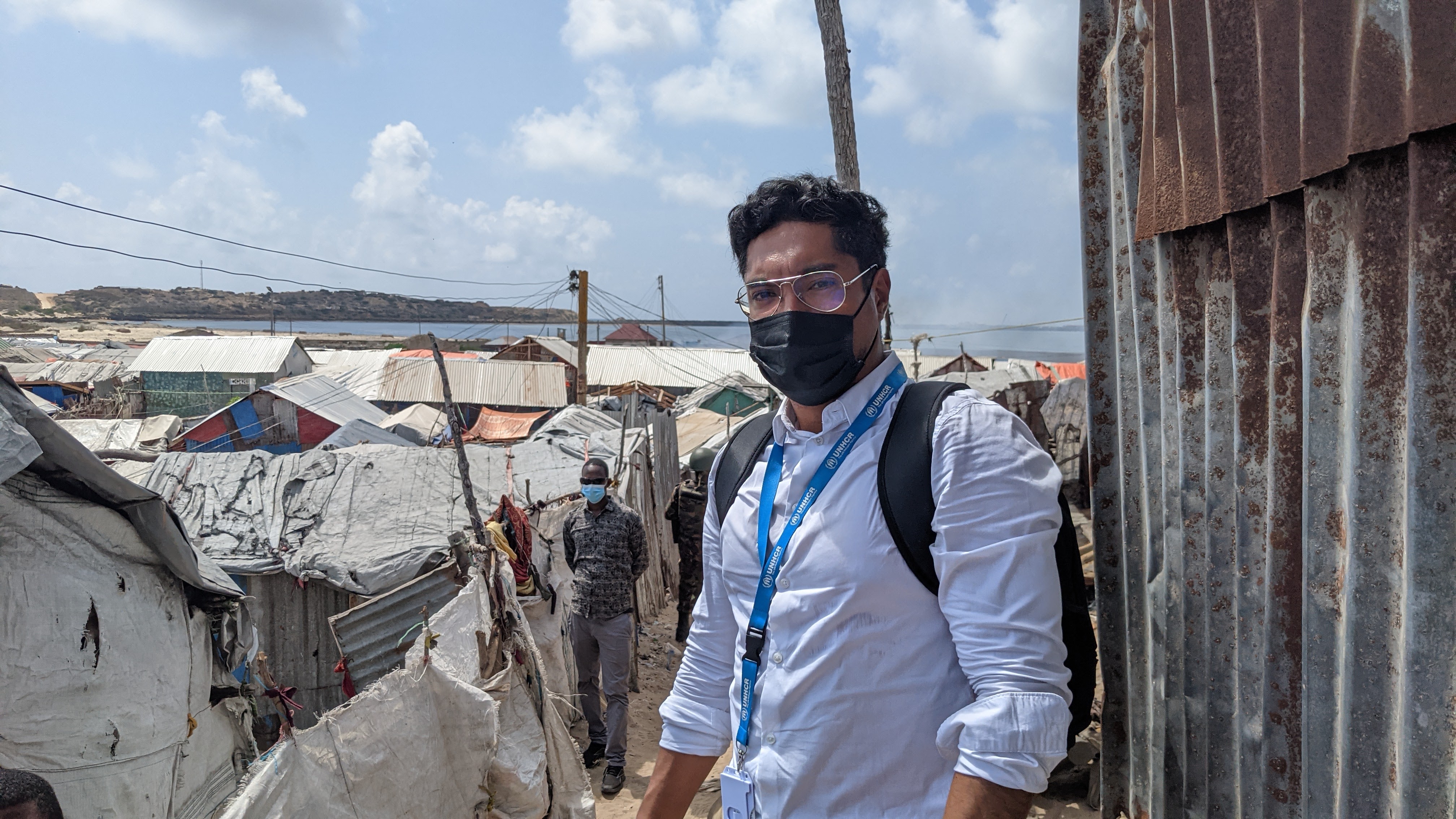Joel Gallardo (Peru) served as a UN Volunteer with the UN Refugee Agency (UNHCR) in Somalia between 2021 and 2022. He was the focal point for the Programme Unit in Kismayo and Jubaland during a drought emergency in Somalia. He shares the lessons he gained during his UN Volunteer assignment.
What were the key highlights of your responsibilities during your assignment with UNHCR Somalia?
I was the programme focal point in Kismayo and Jubaland, covering four field units. I supported the Mogadishu sub-office, monitoring and reporting on key indicators and other information requested by partners. As the field unit programme focal point in Kismayo, I coordinated activities such as capacity building sessions with communities. I interacted with counterparts in different town and regions and regularly visited the people of concern that we served.
How did your work impact the people you served?
Humanitarian work saves lives. As a humanitarian, this is a humbling reality.
Imagine this: the people we serve at UNHCR Somalia were either escaping conflict, famine or a myriad of other issues. They often came from desperate conditions and had nowhere to go. They were mostly women and children – with dreams and hopes for the basics of humanity. I am glad that I contributed to making a difference for some of them.
For example, I was part of the UNHCR Luglaw project. Through this project, UNHCR built new settlements with permanent shelters and basic facilities for 12,500 families. These settlements allowed the government time to resettle the families and close camps for internally displaced persons, giving protection, dignity and a new future.

How did UNHCR value your contributions?
My colleagues at UNHCR were more like a family. My contributions were highly valued. I was selected to be part of the Emergency Response Team, to support other offices around the world facing emergencies, such as Ukraine. I was also invited to speak at various events, including donor meetings.
For my performance assessment, my supervisor said: “Joel is a colleague who has the will, drive and strength to work. He is a new-generation person who is versatile and understands UNHCR systems. He has good ethics. He respects leadership and takes up responsibilities to ensure the smooth running of an office. He is an asset in Kismayo and South Central operations in Somalia.”
What have been your greatest challenges and lessons?
My greatest challenge was living in a military base in the desert, 15 km from the nearest town. We were only two international UN Volunteers in the Field Unit. Often, we rotated responsibilities. Sometimes I was alone in the field, serving as Officer-in-Charge. This isolating working condition was sometimes very uncomfortable for me, considering that I am a very social person. From the beginning, I understood the importance of taking care of myself and my mental health. I decided to create strong routines to keep busy, including a lot of sport activities and calls with family and friends. I was also very deliberate with maintaining a constant state of self-awareness and stayed grounded on my motivation for joining the UN Volunteer assignment.
My motivation was my desire to work in Africa and use my skills to serve families in need. Ultimately, my assignment helped me develop very important skills and a resilient character. Looking back, I am a better professional and a better human being.
What is the one thing you are particularly proud of regarding your work?
As humanitarian workers, we are saving and changing lives. I am proud to have been part of the team undertaking this important duty to humanity in Somalia. Considering that we were a small team in the field with limited resources, we did our best with love and passion. Our inspiration was that our work directly impacted families and communities. The difference we made were clear. Some key foundations for delivering my assignments effectively were accountability, efficiency, and creativity.

What are your thoughts about what it means to volunteer?
A volunteer is a person who decides to be part of something bigger than themselves. Volunteers are usually not hindered by risks, distance, or challenges. As a volunteer, one gets the opportunity to share their time, knowledge, and skills, but also to learn and grow professionally and as a human being. To discover self, new contexts and new worlds. In my case, being a volunteer changed my life. I now see life from a new perspective. I am not the same person that I was before my volunteer assignment in Somalia.
People from local communities would often ask me where I came from or why I traveled so far away from home as a volunteer. My response always came from my heart – the drive and dream to make a difference and serve the families in need, especially in countries that have not had the trappings of wealth available in the global north.
The support from my supervisor and colleagues also helped a lot. They always valued my contributions and appreciated the challenges and benefits of volunteering. They will forever remain to be an important part of my life in Kismayo. My supervisor was also more of a mentor to me, guiding me throughout my assignment. This made a significant difference for me, considering that, as the only Peruvian in my agency, this was my first time working in an African context that I was not initially familiar with. I now understand what it means to be inspiration in action.

